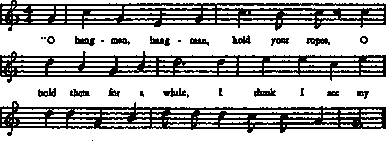Ballads & Songs of Southern Michigan-songbook
A Collection of 200+ traditional songs & variations with commentaries including Lyrics & Sheet music
| Share page | Visit Us On FB |
|
146 Ballads and Songs of Michigan
50 THE GOLDEN BALL
(The Maid Freed from the Gallows, Child, No. 95)
The Michigan form, except for die lack of dialect and for the use of "golden ball" for "goold," is very similar to a version m Child, V, 296. Reed Smith, pp. 93-94, concludes his scholarly study of the ballad with its use as a game and the following resumed "In the game of the 'Golden Ball,' the wheel of the ballad has come full circle. Composed before Chaucer's pilgrimage, sung in England and Scotland during the spacious times of Queen Elizabeth, recorded by the antiquarian scholar Bishop Thomas Percy in the days of George III, just before the American Revolution, scattered over most of the countries of Europe, crossing the Atlantic with the early settlers and still lingering in out-of-the-way places in both America and Great Britain, the ballad of 'The Maid Freed from the Gallows' has in the end become a rude rustic English tale, a Negro cante-fable in the Bahamas and the West Indies, a playlet at a Negro school commencement, and a children's game in the slums of New York City. A long life and a varied one I" For additional discussion and references see Barry, Eckstorm, and Smyth, pp. 206-213; Davis, pp. 360-382; Hudson, p. 16, Scarborough, pp. 196-200, and Smith, pp. 80-94. For some Negro forms of the ballad see Martha M. Beckwith, "The English Ballad in Jamaica," PMLA, XXXIX, 475-476, Henry, JAFL, XLII, 272-273; Walter Jekyll, Jamaican Song and Story (London, 1907), pp 58-59; Elsie Clews Parsons, Fol\-Tales ojAndtos Island, Bahamas (New York, 1918), pp. 152-154; and Scarborough, On the Trail of Negro Fol\-Songs, pp. 34-43.
The present version was obtained in 1915 from Miss Grauman, a student in Michigan State Normal College, Ypsilann, Michigan; she had learned the song in childhood from hearing it sung by an Irish nursegirl in Louisville, Kentucky, about 1883. |
||
 |
||
|
fa-ther's face, A man - y, a man - y a mile."
x "O hangman, hangman, hold your ropes,
0 hold them for a while;
1 think I sec my father's face, A many, a many a mile. |
||